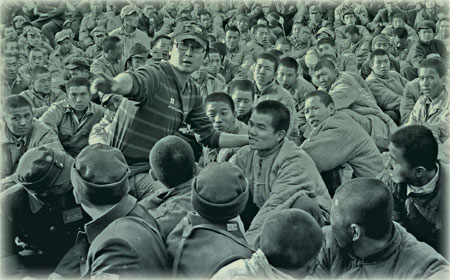 |
|
Lu Chuan instructs actors while shooting the film. [File photos]
|
The diaries of Japanese soldiers who bloodied their hands in the Nanjing Massacre became illuminating reading for director Lu Chuan. Most of the time they wrote details of daily chores, such as eating and showering, but what followed these mundane entries were images of the horrific.
The soldier would write about the 100 captives he shot by the river but on the same page, he would record the delight of finding sugar, which enabled him to make a sweet bean soup.
"They were ordinary people, not devils," Lu says. "But the war turned them into part of the giant killing machine.
"On the first day they occupied the city, they might have been a bit nervous, but after 10, 20 or 30 days, killing was part of life, as ordinary as eating and showering."
In his freshman college year 20 years ago, Lu visited the memorial hall for the Nanjing Massacre victims and examined every showpiece. After the experience he walked away feeling "Nanjing was a city with a scar".
His third movie, "City of Life and Death (Nanjing Nanjing)," screens in cinemas on April 22 and Lu hopes it will help contribute to the healing of these old wounds.
Lu focuses on ordinary Chinese, Japanese and Westerners in the war instead of just charging the Japanese with their atrocities.
"When we talk about the history, we hardly found records about Chinese people and their resistance, but as I did more and more research, I found something was missing," he says.
From numerous historical materials he found in China and Japan, Lu discovered ordinary Chinese did fight back in their own ways.
In the diaries of Japanese soldiers, he found that some Chinese soldiers stayed and had fierce street battles with the invaders after the army captured the city in December 1937.
One Japanese soldier recorded that a group of Chinese soldiers hid in a deserted tank and launched a surprise attack. In another diary, he found that Chinese "comfort women" struggled to grab a knife to commit suicide.
"Some historians have the childish logic that because we did not resist, the massacre becomes more evil," Lu says. "That is ridiculous. It is totally rational for people to fight back when their land is invaded."
In the film Lu creates four Chinese characters both historical and fictional. An officer resists to the last moment; a teacher loses her own life to protect others; a prostitute stands up when the Japanese come to the safety zone for women, and a secretary tries his best to protect his family and compatriots.
"I want to tell the audience that our ancestors were not cowards," he says. "Their salvation, self-salvation and the spirit behind are supporting the nation till today.
"To tell their story is very much a motivation for me to make the film."
More groundbreaking and potentially more controversial is the depiction of the Japanese troops.